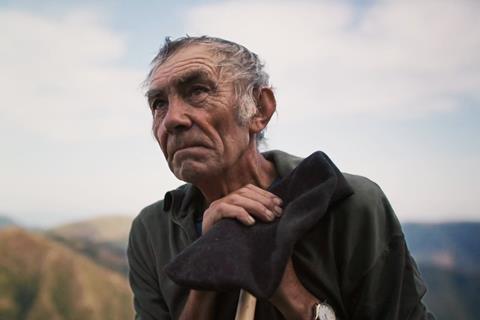Immersive documentary follows the controversial reintroduction of wild bears to the remote French Pyrenees

Dir: Max Keegan. France/UK/USA. 2024. 101mins.
Rewilding may be a subject of interest for city dwellers and greenwash politicians, but people who live and work in areas that border on the wilderness often take a different view. That’s one of the subtexts of first-time British feature director Max Keegan’s lyrical, visually and aurally ravishing documentary, which balances its sympathy for mountain folk with an ecological vision that is wordlessly embedded in every shot. The film set in a remote area of the Pyrenees, where the killing in 2004 of the last native bear has prompted French and Spanish authorities to reintroduce the species – much to the anger of the local shepherding community.
Balances its sympathy for mountain folk with an ecological vision
Offering only the briefest zoom-lens glimpse of a mother bear with her two cubs, this is a nature story that gradually reveals itself to be a human nature story. Playing at IDFA after its surprise premiere at the Camden International Film Festival in Maine, it has a good chance of finding either a prestige screener berth or taking the theatrical route. A wistful, melancholy string, woodwind and piano soundtrack by composer Amine Bouhafa (Timbuktu, Four Daughters) contributes to the universal resonance of this story.
Much like Honeyland or The Truffle Hunters The Shepherd And The Bear is a good example of a film that embeds itself patiently with its subjects. Nothing in the film tells us that Keegan moved to France for three years to make it – other than the bond of trust established here with subjects who are clearly so used to the camera that it might as well not be there.
Immersion can have its downside too, however, and there’s a small one here that may bother some viewers even more than the graphic footage of mauled sheep. Utterly embedded in the ancient rural communities of the Ariège uplands of southwestern France, the film seems to have organically settled on two storylines that never entirely mesh: that of an ageing shepherd with a bear issue, and a minor strand about an amateur photographer who is obsessed with nature. Mostly, this feels like a brave choice, one that tells us there are no easy answers to the ‘farmers versus ecologists’ debate. Just occasionally, it feels like fence-sitting.
Brief on-screen captions fill us on three conflict points: the EU-backed reintroduction of bears to the Pyrenees, the fact that rural communities have grazed their animals in these high mountain pastures for thousands of years, and the lack of young people who see shepherding as a viable career. Wrinkled, taciturn 63-year-old shepherd Yves inhabits the mountains like a second skin, at ease with his flock, his sheepdogs and, surprisingly, with the serious young shepherdess, Lisa, who is spending the summer learning the ropes of the trade.
News reports, scenes of protest rallies and a dramatic bear release (seen partly from the webcam mounted on the cage) introduce a thriller element which translates, in Yves’ remote mountain domain, into a tense wait as mist rolls in and sheep, filmed from above, flow in rivulets across the impervious slopes.
At first we struggle to place frequent cutaways to a seemingly unrelated story – that of Cyril, a teenager whose farmer mother is among the most vocal of the local anti-bear lobby., and who spends as much time as he can up in the mountains dressed in camouflage gear, photographing nature. It gradually becomes clear that he’s in search of the holy grail – a bear sighting.
What is missing, as town hall meetings between locals and environmental authorities get heated, and bear-hunt posses are organised, is any idea of the historical context. If the last native bear was only hunted down in 2004, then the ancestors of these angry shepherds must have coexisted with the problem for centuries. In fact, Ariège villages such as Oust were once celebrated for their ‘montreurs d’ours’ or ‘bear displayers’ who would capture bear cubs – after first killing the mother – and train them to do circus tricks. Still, it’s probably a tribute to Keegan’s resolutely in-the-present documentary that it leaves us interested enough in its subject to want to do our own research.
Production companies: Salthill Films, WILLA, Mile End Films, Pinky Promise, Impact Partners
International sales: Submarine, info@submarine.com
Producers: Elizabeth Woodward, Jesse Moss, Amanda McBaine, Eleonore Voisard, Max Keegan
Screenplay: Max Keegan, Sabine Emiliani
Editing: Sabine Emiliani
Cinematography: Clement Beauvois, Max Keegan
Music: Amine Bouhafa
























